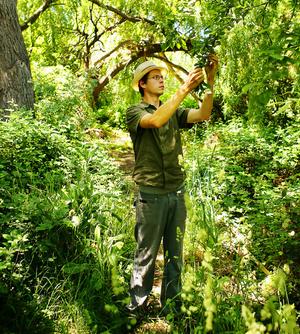Guerilla Gardening: Eating The Suburbs
Posted by Big Gav on December 27, 2008 - 10:28am in TOD: Australia/New Zealand
Topic: Environment/Sustainability
Tags: agriculture, guerilla gardening, suburbia [list all tags]The Age recently had an article on the emerging practice of "guerilla gardening", taking a look at the "Gardening guerillas in our midst". This concept seems to have steadily increased in popularity in recent years (admittedly from a very low base) as the permaculture movement's ideas have been propagated through the community.
Unlike the usual approach taken when trying to grow food in the suburbs - converting spare land on your own property (as discussed by aeldric previously and, more recently, in Jeff Vail's series on A Resilient Suburbia) - guerilla gardening involves cultivating any spare patch of urban land that isn't being used for another purpose, which could provide a substantial addition to the food growing potential of suburbia.
Genesis Of The Guerilla GardenersThe idea of planting on vacant land has been around since at least 1973 when New Yorker Liz Christy and her "Green Guerilla" group transformed a derelict private lot into a garden in the Bowery Houston area of New York.
Since then the practice has spread to the US west coast, the UK and there have been reports of rogue gardeners in action in Brisbane, Sydney (with the Sydney Morning Herald calling the practitioners "bewilderers") and Melbourne.
What Does It Involve ?
In his book "On Guerrilla Gardening", Richard Reynolds, a 30-year-old former advertising employee who now runs guerrillagardening.org, defines the activity as "the illicit cultivation of someone else's land".
"Our main enemies are neglect and scarcity of land," says Reynolds, "Land is a finite resource and yet areas like this are not being used. That seems crazy to me. And if the authorities want to get in the way of that logic, then we will fight them - but peacefully - through showing them what we can achieve with plants."
Guerilla gardening is a crime in Britain (digging up land you do not own is classed as committing criminal damage) but Reynolds insists it is a victimless crime and is clearly unfazed by encounters with police.
Practitioners plant herbs, vegetables and fruit trees in roadside nature strips, along railway lines and in other unused pieces of urban land. They then encourage the local community to tend the plots and reap the harvest.
Choosing the right sites is important for guerilla gardeners to avoid running foul of councils and other landowners. As one gardener noted in The Age", "It's got to be somewhere that no one wants to use. The whole idea is to turn something that was totally useless into something beautiful and useful. If you can find solutions like that, no one's going to hassle you."
Energy Bulletin co-founder Adam Grubb (sometimes known as Adam Fenderson) runs another web site called "Eat The Suburbs" and has achieved a measure of fame in his home town of Melbourne encouraging people to engage in "urban foraging".
Another person encouraging urban gardening, much to my surprise, is new London mayor Boris Johnson, who has launched a project called "Capital growth" that aims to convert 2012 London rooftops and patches of vacant land into vegetable gardens, with a target date of 2012.
In a way this seems to be a revival of the English tradition of "allotments" - a more organised form of urban gardening from a previous age.
How much food could be grown this way ?
I haven't got the foggiest how much additional agricultural production could be achieved if the world's urban areas were swarmed by bands of guerilla gardeners, but walking around my own suburb and imagining every tree along the roads being a fruit or nut tree, and every little scrap of land that has been abandoned to weeds or scrub turned into a wild herb and vegetable patch, makes me think that everyone could have a much healthier diet and save a lot on their food bills if this was the case.
And we'd avoid a huge amount of "food miles" (and the oil consumption this involves) while doing so.
Cross-posted from Peak Energy.
Saturday, December 27, 2008
Mayor of London calls for "Capital Growth" (rooftop and empty lot gardens)!
Cool! "Momentum Magazine" -- the magazine for self-propelled people
Very cool --- finally, a bicycling magazine that's not about the bikes (only), but rather, about how bikes can make cities great.
Momentum Magazine reflects the lives of people who ride bikes. We provide urban cyclists with the inspiration, information and resources to fully enjoy their riding experience and connect with local and global cycling communities.
Mistake on the Lake smarter than the Alley in the Valley?
Cleveland, Ohio, once dubbed "the Mistake on Lake" seems to be a bit more progressive and with it than Salem, at least when it comes to urban farming, specifically keeping chickens.
Subscribe to:
Comments (Atom)





